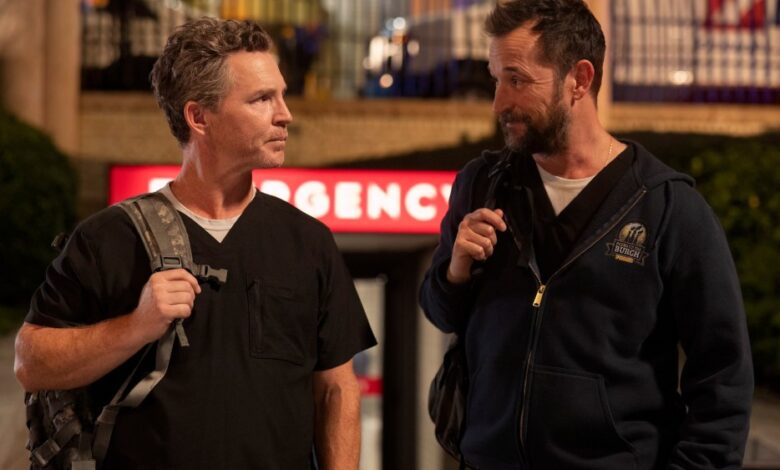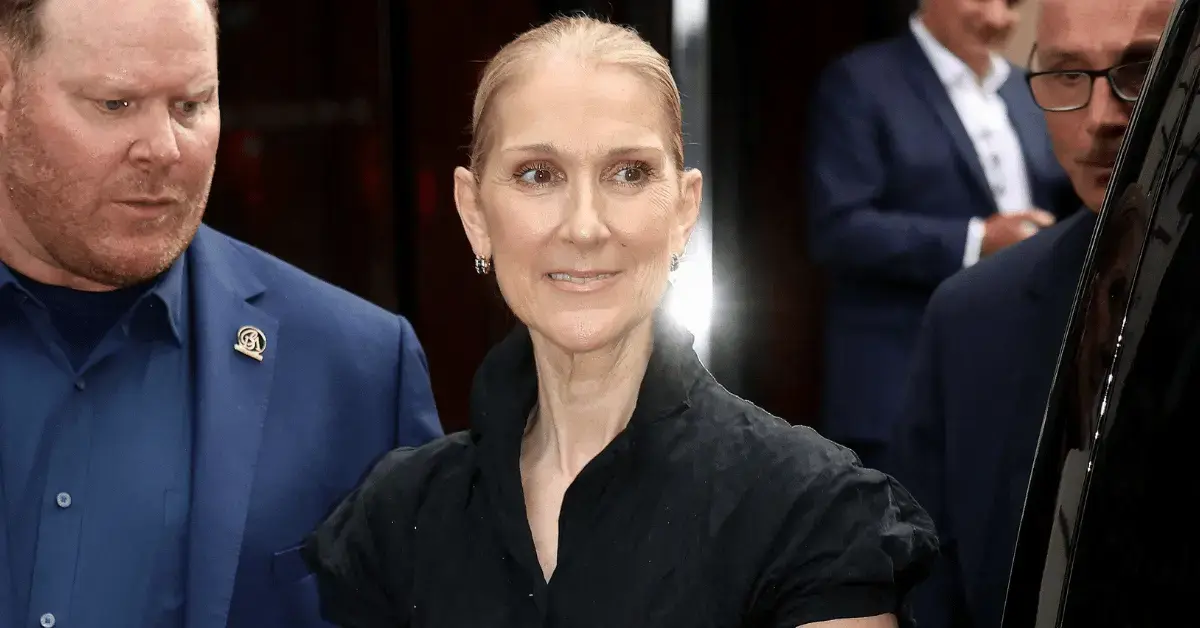Noah Wyle on Season 1 Ending and Season 2 Plans

SPOILER WARNING: This story includes major plot developments for “9:00 P.M.,” the Season 1 finale of “The Pitt,” currently streaming on Max.
By the Season 1 finale of “The Pitt,” the day shift of the Pittsburgh Trauma Medical Center’s emergency department has weathered multiple fentanyl overdoses, a degloved foot, a troubled teenager with a list of girls he wants to hurt, severe sickle cell disease, brain worms, sex trafficking, a stolen ambulance, escaped rats, testicular torsion, mercury poisoning from face cream, an elderly father going off of life support with his adult children at his side, a drowned child, a nail gun attack, a spider bite, a pregnant teen who locks herself in the bathroom, a toddler who ate weed gummies, a risky delivery, a racist and abusive patient, an unvaccinated child with measles, and a flood of critically injured patients from a mass shooting at a music festival. So it’s understandable why, by their 15th hour on the job, everyone is utterly exhausted.
There are, thankfully, some fortunate developments that unfold as the day shift winds down and hands off their patients to the night shift. Dr. Michael “Robby” Robinavitch (Noah Wyle) successfully convinces the cops arresting Dr. Cassie McKay (Fiona Dourif) to let her off with a warning instead. Dr. Melissa “Mel” King (Taylor Dearden) finally convinces the father of the patient with measles to undergo a crucial spinal tap test to ensure he’s getting the proper treatment; that night, she reunites with her sister, and they head off for spaghetti, pizza and a repeat screening of “Elf.” Dr. Trinity Santos (Isa Briones) convinces a suicidal patient to seek help; later, when she discovers that Dennis Whitaker (Gerran Howell) is living in a room in the vacant wing of the hospital, rather than mock him (as she has all day), she invites him to stay in her spare room, instead.
The outlook for others, however, is on shakier ground. Dana Evans (Katherine LaNasa), the ER’s formidable charge nurse, is so shaken from being attacked by a patient earlier in the day that she gathers up all of her belongings when she leaves, convinced she’s quitting the job for good. Dr. Frank Langdon (Patrick Ball), meanwhile, gets a second dressing down from Robby for stealing prescription medication from the ER; Robby tells him his only path back to practicing medicine is a 30-day inpatient treatment program followed by mandatory random urine tests and Narcotics Anonymous meetings.
Langdon then fires back at Robby: “What about you, man? I’m not the only one who’s fucked up here. Why don’t you look in the mirror?!”
Patrick Ball and Noah Wyle in “The Pitt.”
Warrick Page/MAX
It’s the question that has been dogging Robby since he started his shift, the first time he’s worked on this particular day since he watched his mentor die from COVID five years earlier. The pressure reached a climax in Episode 13, when he broke down in sobs after he couldn’t save his quasi-stepson’s girlfriend from severe gunshot trauma. In Episode 15, Robby has to tell the girl’s parents about her death, an emotional blow that sends him up to the same rooftop where, at the start of his shift, he found fellow ER attending Dr. Jack Abbot (Shawn Hatosy).
Abbot finds Robby standing in the same spot, right by the edge. He tells Robby that saving people is in their DNA, and that there’s nothing wrong with breaking down.
“That is what happens when you’re in a war and nothing makes sense,” Abbot says. “We survived as a species because we learned how to cooperate and communicate, so when we’re in the middle of killing each other, it defies the very logic of our existence. Your brain starts to short-circuit. All you can do is focus on the medicine.”
Robby, still wracked with grief, says quietly, “I’m going to need a drink if you keep talking.”
So they both wander down to the park just outside the hospital, joined by Dr. Samira Mohan (Supriya Ganesh), some of the ER nurses — Princess Dela Cruz (Kristin Villanueva), Donnie Donahue (Brandon Mendez Homer) and Mateo Diaz (Jalen Thomas Brooks) — and med student Victoria Javadi (Shabana Azeez). They crack open some beers to toast their colleagues, the patients they saved and the ones they couldn’t save, while Abbot removes his prosthetic leg (heretofore unknown to viewers) so he can clean some blood off of his shoe. And then Robby starts to laugh.
“I just realized this is your first shift,” he says to Javadi. “I can pretty much guarantee you the next one will be easier.”
“I really fucking hope so,” she says.
We won’t be seeing that particular shift on Season 2 of “The Pitt.” Instead, in an interview in March for this week’s Variety cover story on Wyle, executive producer John Wells and executive producer and showrunner R. Scott Gemmill said the show will jump forward roughly nine to ten months, taking place the following July. Wyle, who is also an executive producer and writer, expects Robby to have started his uncertain journey to recovery from his pandemic-related PTSD. They also discussed the possibility of Dana and Langdon’s return, how much “The Pitt” will reflect the current turmoil in the world of health care, and what motivated the season finale revelations about Abbot and Whitaker.
R. Scott Gemmill and John Wells
The energy of the final two episodes is much less intense after Episodes 12 and 13, which focus on the mass casualty event. Why did you decide to structure it like that?
R. Scott Gemmill: Well, there were days where we thought, “Boy, if we could just end the season at the end of Episode 12, we’d just be happy,” because where do you go from there? I guess it’s just about being honest. If someone goes through this, what is the aftermath and how do they deal with that?
Did you look at alternative structures?
Gemmill: We moved things a lot. It’s not written in stone. So when’s Robby going to have his meltdown? Is that the season finale? We ultimately landed on having the mass casualty in 12 and 13 spill over into 14, and then see how this affects people in the aftermath. And so that’s where you see Javadi is just beaten down, Samira is so upbeat, but then finally catches up with her.
We did a lot of research last year too. We talked to and listened to the doctors and nurses and those who had worked the Las Vegas shooting [in 2017]. We really strive to be as honest and respectful as we can to the people who have gone through similar tragedies like this. It just seemed like the right way to do it and to have some fallout.
John Wells: I think part of it too is just being honest about the format, which is when you work a long shift as an emergency room physician or nurses, there’s a handoff period in which you’re still there and other people are picking up the new cases that are coming in. There’s a way in which they actually have to wind down from all of this. What’s the statistic there, the average ER physician has to see a patient every three to four minutes?
Gemmill: Yeah. They get pulled from one task to another. It’s ping pong.
Wells: And then you’ve got to hand off your cases, you have to do your paperwork. We wanted to be honest about what that experience is for the physician. What do you do after that much adrenaline? Do you just go home? How do you wind down? How do you think about what to do next?
Did you shoot the scene where they drink beers in a park in Pittsburgh?
Gemmill: Yeah, that’s right across from Allegheny General Hospital. That’s the real hospital when you pan up at the end, and that’s where we shot the roof as well.
Shawn Hatosy in “The Pitt.”
Warrick Page/MAX
There are a few revelations in the finale. The biggest, I think, is that Dr. Abbot has a prosthetic leg. Were you always planning for that?
Gemmill: Oh yeah. In a traditional series, you might not know how you’re going to end the season, right? Because we were in real time, 15 hours, we had to have an idea. So a lot of the scenes that you see much later in the season — like the roof scene, the park scene, the scene where Robby throws Langdon out, the scene where Dana talks about quitting, the scene where Collins [played by Tracy Ifeachor] confesses having had an abortion — all those were written close to the first episode because we needed to know that those actors could get there. They were audition scenes.
And then I really wanted Abbot to have been a vet who had lost a limb and but was still rocking and rolling.
Wells: We really wanted it to be a surprise. There was no mention of it. Nobody talks about it. Just somebody with a disability that doesn’t limit him. So that was the intent. It wasn’t meant to be like, “Oh, my God!” It was meant like, “Oh, wait a second…”
He does talk so much about combat medicine, so I do feel like you were setting the stage so it wasn’t completely out of nowhere.
Gemmill: Yeah, it wasn’t a cheat. It was always there and that was part of his makeup. That’s why nothing fazes this dude.
We also learn that Whitaker has been essentially squatting in the unoccupied wing of the hospital. Was that also something that you wanted to do from the start?
Gemmill: Yeah, because that’s the debt that these poor devils go through. If you’re not on a scholarship or have wealthy parents, it’s almost debilitating when they come out of [medical school], how much money they owe. And the reality is a lot of hospitals have dead wings that they’re not using. That’s part of the problem. It’s not just funny that he’s living up there, but it’s also the fact that that whole wing is not being used also impacts the ER. If that wing was being used, there would be more beds upstairs. So it’s all tied in together.
Gerran Howell in “The Pitt.”
Max
Wells: Plus, there is actually a couch-surfing culture, particularly with medical students in the early days of their residency. They’re not paid enough. It’s a real thing.
Gemmill: Whitaker wouldn’t have gotten a paycheck until Season 2, when he becomes an intern. And it’s not a lot.
Speaking of Season 2, are you going to keep the real-time format?
Gemmill: We’re going to stick with the format because I think it works really well. I think a change would change the show too much, and I don’t know what that other show would be. This has worked for us.
I gather you’re looking at a time jump.
Gemmill: We wanted to do a time shift or make it later, only because to do the next day, it’d be too much of the same. And also because I do expect to see Langdon again. He needs to go through at least 30 days of in-person rehab as part of his recovery if he ever wants to practice medicine again.
At the moment, we’re thinking it’s going to [take place] around July. We can only really shoot [in Pittsburgh] in September, so whatever time of year we have in our fictional world, it has to look like whatever we can shoot in September. So it’s either spring or summer. We don’t want to do a winter show. I think it’ll be about nine months later, and that way, when we come back, you have to get all the information about the characters out within 15 hours. I think that’s good for the audience too, because they’re playing catch up a little bit.
Wells: I also think that, by doing a single day shift, it relieves you of the responsibility of doing a lot of medical melodrama for the personal lives of the characters. It’s what you learn in your daily work life wherever you work.
How much do you want the show to reflect the Trump administration’s dismantling of the public health system across the country?
Wells: It’s hard because we’re hoping to air the same time next year in January, so you don’t want to get too specific in a contemporary way. If there are significant changes to Medicaid, it’s going to have a major impact, and we will know that before we’re actually shooting. We deal with many, many people who are in the field who work as advisors. We’ll hear right away what those implications are. We’re not going to guess. I think there are going to be a lot of lawsuits and we don’t want to get too far in front of it and then find ourselves telling stories about things that don’t actually happen. It’s a fast-moving train, our political system right now, but it’s a real concern.
Warrick Page/MAX
Noah Wyle
Dr. Robby has already had breakdown now, so I wouldn’t think it’s something you’re keen to duplicate. Where do you want to take him next?
That’s a funny thing when you don’t think you’re going to do a second season, you leave it all on the floor in the first season. Then you suddenly go, “Oh, my God. OK, life continues. So what do we do now?” The best way to answer that is to recognize that, in a perfect world, this show goes several seasons, so we don’t have to rush this process. The responsibility is now on us to say, “Where would these people be nine months later?” And answer that honestly and thoughtfully.
How will that work for Dr. Robby, do you think?
He’s going to go home after episode 15, drink that other beer, probably something else so he can fall asleep and he’s going to wake up the next morning and no longer be able to pretend to himself that he doesn’t need help. He can maybe pretend to a couple of people, but not for very long. So even in a performative way, he’s going to have to start exploring what different modalities are available and seeing which ones have resonance.
I’m really interested in the exploration of somebody who now wants to get help but is their own worst enemy in embracing it. He’ll be devil’s advocate. He’ll try to shoot theories and holes in anything, but inadvertently he’ll find some kind of ladder, and in doing so, I hope that we are able to show a range of modalities of treatment, a range of options that people can make use of.
How much do you expect Season 2 will reflect how upside down the world of medicine and medical research is right now?
It’s a tricky one. We did storylines that made us seem rather prophetic because we just happened to hit the zeitgeist. We thought it’d be interesting to do a case about neurocysticercosis, brain worms, and then RFK Jr. confirms he was diagnosed with brain worms. We wrote the script four months earlier. It makes it seem like we’re pulling from the pages of today’s headlines but in that case, we were looking into a bit of a crystal ball.
And the measles storyline.
A big part of our writing room is having what we call expert interviews with people from every aspect of health care. We bounce storylines and character development off of them and then we always ask, “What is it you would love to see on TV? What is it you’re not seeing on TV? What messaging would be really important for you to see on TV? What would be really bad messaging for us to accidentally put on TV that would be counterproductive to your aims?” We get a lot from that.
How has that been for Season 2?
This round of interviews we’ve unfortunately had to say, “Can you look into a crystal ball and let us know the worst-case scenarios that you might be fearing right now? What stopgap measures you might be employing to stave that off? Who the most vulnerable populations would be? Where are these cuts to be made? What do you see the immediate effects being? What do you see the long-term effects being?”
One of our technical advisors, Dr. Mel Herbert, just got back from building a hospital in Africa. He left looking at pallets and pallets of vaccinations that will not be distributed now that USAID is no longer able to distribute. The patients are right there. The pallets of medicine are right there. They’re going to expire. No one will ever use them. They still can’t give them. He came home crestfallen that all the work he’s been building toward is about to be for naught.
We’re going to allow certain programs to continue, but nothing having to do with vaccinations, nothing having to do with malaria prevention, nothing that would save millions and millions of lives. We don’t really know how to write to it. In the next couple of months, we may find a way to incorporate some of this stuff.
Patrick Ball and Katherine LaNasa in “The Pitt.”
Warrick Page/MAX
Scott told me that Patrick is returning for Season 2, so you get to…
Yell at him some more?
Exactly. But is Dana coming back?
I don’t think I’m at liberty to discuss anybody’s individual contract, except to say that everybody’s fan favorites will most definitely be back. One of the things that’s very hard about having an ensemble of actors we really love is that we want everybody to come back. At a certain point, the way a hospital is staffed, you don’t keep medical students in there for five years. There has to be a matriculation at some point. We don’t want it to be next year, but at some point, we’re going to have to play the realities of the ebb and flow of an emergency department.
Do you think Season 2 will be a night shift?
I don’t know. If we jumped to a night shift and didn’t bring back so many of the characters that we’ve already established, we’d be doing ourselves a disservice — even if the novelty of a new set of cases and the new environment would be exciting. Doing a 15-episode season with a 12-hour shift means you have to bleed into the shift that comes before and after to give you a sense of passage and revolution of staff.
It does sound like something you’ve considered.
I pitched a night shift because I thought it would be novel, but I don’t think we need to do it. It’s interesting. I had some ideas about how we could artfully put a little spin on it. And to his credit, Scott was just like, “I like rules. Rules are there really to support the writing. If you don’t have to break a rule, you shouldn’t.” Right now we’ve got a format that’s working. I think the discipline is to make it work better, not to change it. If we can’t make it better and we need to change it, then we will. But if these are suggestions that we probably will employ if and when we come to a Season 3 or Season 4.
So your suggestions were about altering the structure of the show?
Yeah. What if you took the first hour and just focused on how everybody gets to work, their commute?
Watching the first season, I did wonder if one of the episodes would stay with just one patient’s experience for the whole hour.
The temptation to go — I don’t want to call it gimmicky, but to get a little arty with the format is very potent. It’s really tempting to say, “Well, if somebody is doing a therapy session, what if we just did a whole hour in that therapy?” Yet, I don’t think that’s what our show is right now. We don’t have to, so we shouldn’t. It’s a good discipline to stay the course the way we’re doing it.
Because you’re looking at setting it in July, were you thinking you might set it over the July 4th holiday?
That’d be fun. We should do that. It’s a great idea, Adam. Don’t sue us if we use it.
Both interviews have been edited and condensed.







